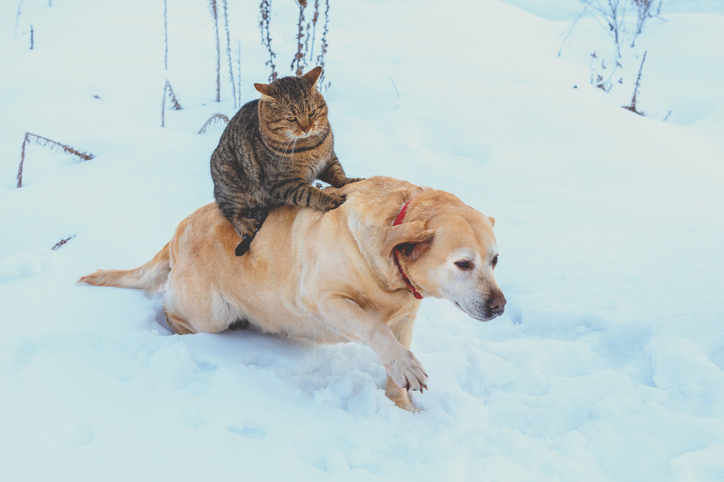
“If you’re cold, they’re cold.” While this is a good sentiment, there’s more to cold weather pet care than simply taking pets indoors or giving them an extra blanket. These tips will help you give your clients the tools they need to keep their pets safe this winter.
Overestimating Cold Resistance
Many pet owners think that their pets’ fur will keep them warm in the winter.
Even Huskies have trouble when temperatures dip below freezing, and some pets
have added complications when the weather turns cold:
- Short hair dogs and cats have less protection from the elements.
- Short legged animals are more likely to brush against snow.
- Diabetes, hormonal imbalances and kidney disease can interfere with body
temperature regulation.
- Old and young pets at higher risk due to a lack of fat and slower
metabolisms.
- Fur can’t stop heat loss when wet.
Clothing works for dogs, but represents a strangulation risk. It also doesn’t
work when wet and isn’t foolproof. However, boots are a good way to protect
foot pads, which are at high risk of frostbite.
Creating Safe Environments for Pets
It may be impossible to bring large breed dogs inside for long periods of time.
With enough time, outdoor cats can be trained to come inside by leaving a door
or window open while feeding them treats indoors. However, this acclimation
process can take months.
- Establish a dry, warm outdoor shelter.
- Make sure the pet has plenty of water. A heated dish or birdbath heater are
both good options to keep water from freezing.
- Bedding should be checked frequently and replaced if it isn’t clean and dry.
Wet bedding can freeze animals.
- Owners should use animal heated blankets and pads, not ones made for indoor
use on beds.
Knowing the Signs of Hypothermia and Frostbite
Signs of hypothermia including shaking, anxiousness, whining, and slowness of
movement are usually immediate. However, frostbite may take days to show up.
Encourage clients to contact your clinic as soon as possible if they suspect their
pet experienced either condition.
Reducing Chemical Dangers
Rock salt used to melt ice can burn foot pads and can cause digestive issues if
the pet eats the crystals. “Pet safe” alternatives are available, but they
aren’t foolproof. They can cause chemical burns over long-term exposure, as
well as gastrointestinal distress if the pet drinks melt-contaminated water.
Exposure risks to antifreeze is higher in winter due to coolant leaks. Owners
should wash off the legs, paws and underside of dogs to remove any remnants of
antifreeze and deicers before they have a chance to lick them.
Making Potty Breaks Safer for Dogs
If they take their dogs outside in freezing weather, owners should shovel an
area of the yard. Creating a snow free area reduces their pet’s exposure to the
cold while it does its business. They can also create indoor peeing areas using
pee patches and pads. It’s even possible to train dogs to use liter boxes.
Protecting Neighborhood Cats
There is one thing we all need to remember this winter: outdoor and feral cats
will curl up next to engines for warmth. Before starting your vehicle, beat on
the hood or honk the horn to scare off cats before they can be burned or
injured by moving parts.
Making a Pet Disaster Kit
Clients need a plan and a collection of necessities to take care of their pets
in bad weather. This should include water and food to last for 5 days, along
with medications and other supplies to last through power outages and winter
storms. Exotic pets may pose added problems. Fish need battery-operated oxygen
supplies, while lizards need alternative heat sources from their electric
rocks.
Make sure your clinic information is clearly printed on anything you send
clients home with, whether it’s medicine, prescription
bags, guides or receipts. Refrigerator
magnets are a great way to keep clinic information on hand. This
makes it easier for your clients or outside health providers to contact your
practice in an emergency.
Positive Impressions Has Everything You Need to Keep Your Clinic on Client’s
Minds
For over a decade, Positive Impressions, LLC has offered veterinarians with products that help them build relationships with their clientele. We offer custom printing for most of our products, including prescription pads, medicine labels, bags and reminder cards. Get started by checking out our latest specials on our website.
